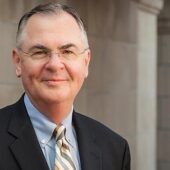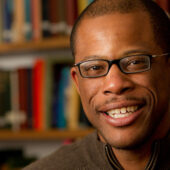Through the Google Glass
 In "Accessing Information in the 21st Century," an instruction librarian incorporates Google Glass into class as a catalyst to research, discuss and explore information-related themes, such as privacy and social responsibility.
In "Accessing Information in the 21st Century," an instruction librarian incorporates Google Glass into class as a catalyst to research, discuss and explore information-related themes, such as privacy and social responsibility.Categories: Research & Discovery

 Despite losing her vision three years ago, Kathryn Webster entered Wake Forest last fall with the goal of pursuing a dual degree in mathematics and business. Faculty and staff found a novel suite of technologies to help her see math clearly.
Despite losing her vision three years ago, Kathryn Webster entered Wake Forest last fall with the goal of pursuing a dual degree in mathematics and business. Faculty and staff found a novel suite of technologies to help her see math clearly. Wake Forest University Law and School of Medicine Public Health Sciences Professor Mark Hall has been elected to the Institute of Medicine (IOM), a subset of the prestigious National Academy of Sciences.
Wake Forest University Law and School of Medicine Public Health Sciences Professor Mark Hall has been elected to the Institute of Medicine (IOM), a subset of the prestigious National Academy of Sciences. Wake Forest President Nathan Hatch has been inducted into the American Academy of Arts and Sciences. One of the nation’s most prestigious honorary societies, the Academy is also a leading center for independent policy research.
Wake Forest President Nathan Hatch has been inducted into the American Academy of Arts and Sciences. One of the nation’s most prestigious honorary societies, the Academy is also a leading center for independent policy research. More than 50 years after Martin Luther King Jr. spoke at Wake Forest, universities across the country are making headlines related to race and identity. At a time when Wake Forest has a more diverse study body than ever, the campus community is addressing these challenges together.
More than 50 years after Martin Luther King Jr. spoke at Wake Forest, universities across the country are making headlines related to race and identity. At a time when Wake Forest has a more diverse study body than ever, the campus community is addressing these challenges together. A Wake Forest tradition, Hit the Bricks is an eight-hour relay race along the brick pathways of Hearn Plaza in honor of Brian Piccolo, a Wake Forest alumnus and Chicago Bears running back who died of cancer at age 26.
A Wake Forest tradition, Hit the Bricks is an eight-hour relay race along the brick pathways of Hearn Plaza in honor of Brian Piccolo, a Wake Forest alumnus and Chicago Bears running back who died of cancer at age 26. Four undergraduate students and their computer science professor, Sam Cho, were recognized for their fresh perspectives on developments in the field of molecular dynamics computer simulations — the subject of the 2013 Nobel Prize in Chemistry.
Four undergraduate students and their computer science professor, Sam Cho, were recognized for their fresh perspectives on developments in the field of molecular dynamics computer simulations — the subject of the 2013 Nobel Prize in Chemistry. David Hughes (’15), a computer science major, spent the past five months working on Intel’s Connected Wheelchair Project, which was unveiled at Intel’s annual development conference held mid-September in San Francisco. The Connected Wheelchair Project received international attention as a result of an endorsement from world-renowned physicist Stephen Hawking.
David Hughes (’15), a computer science major, spent the past five months working on Intel’s Connected Wheelchair Project, which was unveiled at Intel’s annual development conference held mid-September in San Francisco. The Connected Wheelchair Project received international attention as a result of an endorsement from world-renowned physicist Stephen Hawking. U.S. News & World Report’s Best Colleges 2015 guidebook, which hits newsstands this week, highlights Wake Forest’s leadership in the national trend of promoting students’ social and emotional wellbeing. The story shows how schools like WFU tackle stress to provide a better environment for students.
U.S. News & World Report’s Best Colleges 2015 guidebook, which hits newsstands this week, highlights Wake Forest’s leadership in the national trend of promoting students’ social and emotional wellbeing. The story shows how schools like WFU tackle stress to provide a better environment for students. Students in professor Ron Neal's religion class explore the connections between hip hop and the stories we've all grown up with as Americans — the idea of the self-made man, the achievement of the American dream and the belief that hard work will lead to the good life.
Students in professor Ron Neal's religion class explore the connections between hip hop and the stories we've all grown up with as Americans — the idea of the self-made man, the achievement of the American dream and the belief that hard work will lead to the good life.